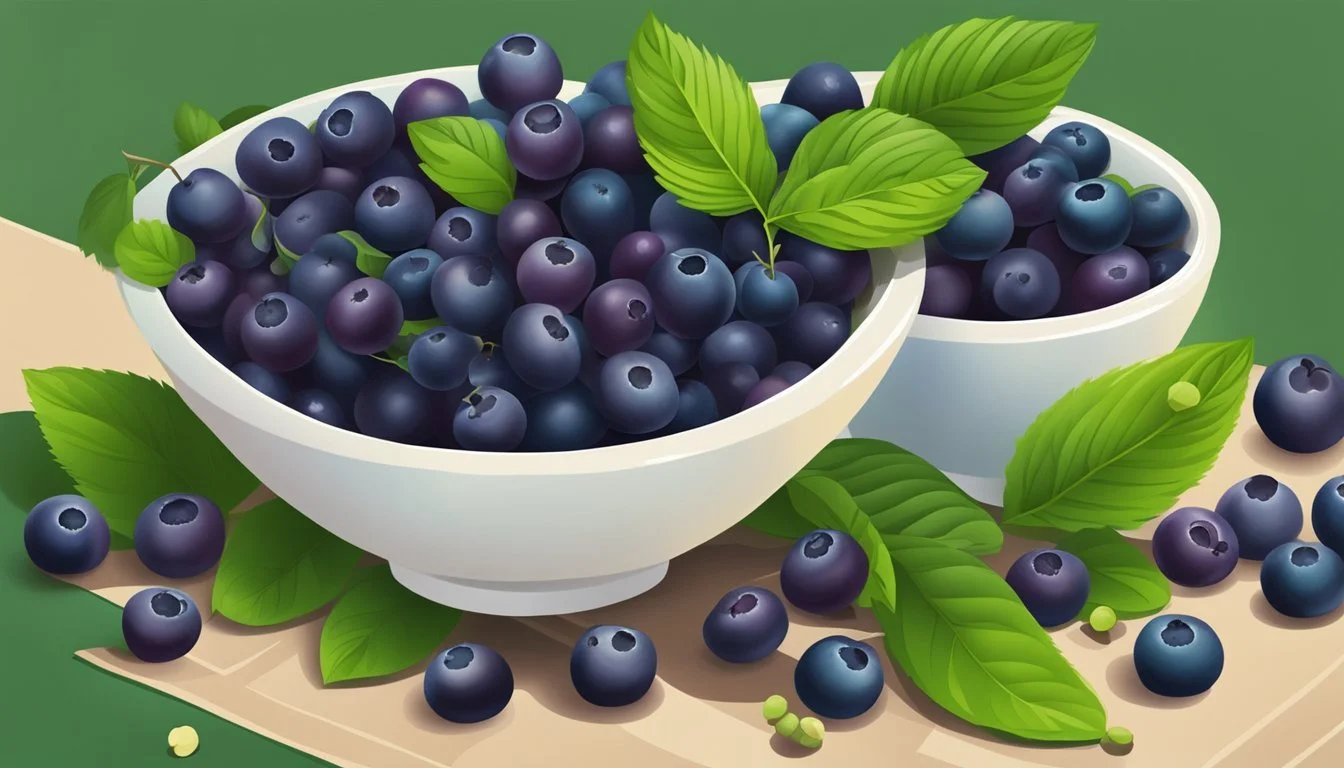What Are the Health Benefits of Huckleberries?
Uncovering Nutritional Facts
Huckleberries, small and round fruits found in North America, have long been valued for their delightful flavor and numerous health benefits. Rich in nutrients, these berries are not only a traditional food among Native American tribes but have also captured the attention of modern nutrition science. Characterized by their similarity to blueberries in appearance and taste, huckleberries are densely packed with antioxidants, vitamins, and minerals.
The nutritional profile of huckleberries includes a significant amount of vitamin C, which is essential for immune system function, collagen synthesis, and overall skin health. Additionally, the high antioxidant content in these berries, particularly anthocyanins, contributes to their potential in safeguarding the body against oxidative stress, which has been linked to chronic diseases and the aging process. Consumption of huckleberries may also offer protection for the eyes and skin from environmental damage and aid in maintaining overall cellular health.
Moreover, the fiber in huckleberries supports digestive health, while their low calorie and fat content make them an excellent choice for a healthy diet. The connection between huckleberries and Native American traditional remedies further emphasizes the historical importance of these berries as a natural source of nourishment and healing. As a result, huckleberries continue to be a subject of interest for those seeking to enhance their health through diet.
Nutritional Profile and Key Vitamins
Huckleberries are a nutrient-dense fruit, offering essential vitamins and minerals, while maintaining a low calorie content. They provide a range of antioxidants and are a source of key macronutrients, often compared favorably to other berries.
Essential Vitamins and Minerals
Huckleberries are packed with vitamin C and vitamin A, essential for immune function and vision health, respectively. The fruit also contains iron, necessary for blood production, and a modest amount of calcium, important for bone health. Their rich antioxidant content, including the presence of anthocyanins, offers protection against cellular damage.
Vitamin C: Approx. 3mg per 100g (3% of Daily Value)
Vitamin A: Approx. 79 International Units per 100g (2% of DV)
Iron: Approx. 0.3mg per 100g (2% of DV)
Calcium: Content available in trace amounts
Macronutrient Composition
Huckleberries have a balanced macronutrient profile consisting primarily of carbohydrates. They contain a relatively small amount of protein and fat. Fiber content in huckleberries contributes to digestive health and can aid in maintaining a feeling of fullness.
Calories: 37 per 100g
Carbohydrates: 8.7g per 100g
Protein: 0.4g per 100g
Fat: 0.1g per 100g
Fiber: Content not specified
Comparison with Other Berries
When compared to other berries, huckleberries provide similar vitamin and mineral content but stand out with their unique antioxidant profile. While other berries like blueberries are praised for their health benefits, huckleberries are a competitive alternative, especially given their comparable vitamin C and fiber levels. The caloric value is also on par with other low-calorie berry options, making them a suitable choice for a nutrient-rich, low-energy diet.
Health Benefits
Huckleberries are noteworthy for their robust nutritional profile, which confers several health benefits ranging from antioxidant activity to bolstering the immune system. These small but mighty berries offer protection and support to various bodily functions due to their unique compounds.
Antioxidant Effects and Chronic Disease Prevention
Huckleberries are rich in antioxidants, including anthocyanins, which are pigments that give these berries their distinctive color. These antioxidants help neutralize harmful free radicals in the body, reducing oxidative stress and potentially lowering the risk of chronic diseases such as cancer and heart disease.
Heart and Vascular Health
Regular consumption of huckleberries may contribute to improved heart and vascular health. These berries can aid in lowering cholesterol levels, protecting against vascular diseases, and promoting overall cardiovascular health. The anthocyanins in huckleberries also play a role in strengthening blood vessels and improving circulation.
Immune System Support
The high vitamin C content of huckleberries is essential for a strong immune system. This vitamin acts as a powerful immune booster, enhancing the body's ability to fight off infections. Moreover, the presence of anti-inflammatory properties in huckleberries helps in reducing inflammation, which is often linked with immune system health.
Improving Digestion and Reducing Inflammation
Huckleberries can support digestion thanks to their fiber content and anti-inflammatory properties. Consuming these berries may help maintain a healthy gut lining, which is crucial for optimal digestion and nutrient absorption. Additionally, their anti-inflammatory properties may alleviate symptoms associated with inflammation in the digestive system.
Huckleberries in the Diet
Huckleberries are versatile berries that can easily be incorporated into various meals, enhancing both the flavor profile and nutritional value. With their sweet and tart taste, they make a delightful addition to an array of recipes.
Incorporating Huckleberries into Meals
Huckleberries can enrich everyday diet with their high vitamin C content and antioxidants. Here are simple ways to incorporate them:
Breakfast: Add fresh or dried huckleberries to oatmeal or pancakes for a nutrient-packed start to the day.
Baking: Fold them into muffin batter, or use them in dessert recipes to provide a naturally sweet flavor.
Culinary Uses
Fresh Huckleberries: Ideal for jams or syrups, fresh huckleberries offer a burst of flavor and color to dishes.
Dried Huckleberries: Used in:
Baked goods like muffins and pancakes
Trail mix for a healthful snack
Huckleberry Jam: A popular condiment that pairs well with bread or pastries.
Huckleberry Desserts:
Homemade huckleberry ice cream
Sweet huckleberry syrup for enhancing desserts and breakfast items
Incorporating huckleberries into various recipes not only adds a distinctive taste but also leverages their health-enhancing properties.
Botanical and Historical Context
The huckleberry is a fruit bearing significant botanical diversity and a history intertwined with cultural practices. Its species span across various habitats and climates, while its cultural import extends back centuries.
Species Varieties and Habitat
Huckleberries belong to the Ericaceae plant family, closely related to blueberries and bilberries. Within this family, two notable genera encapsulate huckleberry species: Vaccinium and Gaylussacia. Vaccinium includes blueberry varieties, which possess a distinct botanical profile. Huckleberry plants are primarily found in North America, with their habitat ranging from the coniferous forests of Canada to the woody mountainsides and shaded regions across different climates. It's worth noting the berries produced can vary in color, from red to blue to almost black, depending on the species.
Geographic Distribution: Widely distributed across North America.
Color Variance: Ranges from red, blue, to black.
Similarities: Related to blueberries in the Ericaceae family.
Cultural Significance
The history of huckleberries is rich with cultural significance, particularly among indigenous peoples of North America. These berries have been used both for their flavorful contribution to foods and medicinal properties. They have also played a part in trade and economy, historically becoming a staple food source for early settlers and indigenous communities alike. The berry's flavor profile, a mix of sweet and tart, has been celebrated in various culinary traditions and continues to be a key ingredient in regional dishes.
Culinary Role: Key ingredient in traditional pies, jams, and preserves.
Historical Importance: Used by indigenous peoples; integrated into early settler diets.
Huckleberries, enriched with flavonoids and polyphenols like anthocyanins, are more than a garden variety berry but a botanical treasure spanning diverse species and a storied history of cultural integration.
Frequently Asked Questions
In this section, readers can find answers to commonly asked questions about the health benefits and considerations of huckleberries.
Are there nutritional benefits to eating huckleberry leaves?
While huckleberry fruit is celebrated for its nutritional benefits, the leaves are traditionally less commonly consumed. One should note that scientific research on the health benefits of huckleberry leaves is limited, so any suggested benefits are not well-documented.
What advantages does consuming huckleberry tea offer?
Huckleberry tea may inherit antioxidants present in the berries, including the potential for reducing inflammation and protecting against certain chronic diseases. However, the concentration of these beneficial compounds in tea form may vary.
Is it safe to eat huckleberries in their raw state?
Huckleberries are generally safe to consume raw and are often enjoyed in this state. They provide a rich source of vitamin C and antioxidants when fresh.
How do huckleberries compare to blueberries in terms of health benefits?
Huckleberries and blueberries are similar in their nutritional profiles, both being high in antioxidants and vitamins. Some believe that huckleberries may contain higher amounts of certain antioxidants, but both are considered healthful berry options.
What makes huckleberries unique in their health effects?
Huckleberries contain specific antioxidants like anthocyanins, which are known for their health-promoting effects, such as protecting eye and skin health. The uniqueness lies in the particular blend of these compounds in huckleberries.
Are there any known adverse reactions to consuming huckleberries?
Huckleberries are generally safe and there are no widely recognized adverse reactions associated with their consumption for most individuals. However, as with any food, individual allergies or intolerances can occur.



